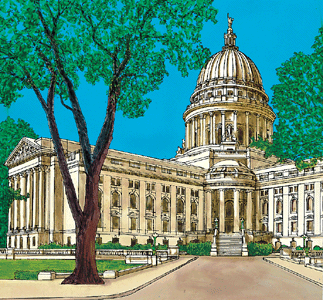Wisconsin Governor Beats Back Recall
Thursday, June 7th, 2012June 7, 2012
The Republican governor of Wisconsin, Scott Walker, handily won a recall election on June 5. Walker took 51.6 percent of the vote, compared with his opponent Tom Barrett’s 46.3 percent. Walker is the first U.S. governor to survive a recall election. (Two other governors have been recalled.) Walker was elected governor in the 2010 congressional and state elections that were highly influenced by the Tea Party movement.
His recall victory dealt a painful blow to Democrats and labor unions. The recall was largely prompted by Walker’s move to cut collective bargaining rights for most public workers in the name of cost cutting. (Collective barganing is the negotiation about wages, hours, and other working conditions between workers organized as a group and their employer or employers.)

In 2011, the Wisconsin State Capitol in Madison was the scene of massive demonstrations against legislation sponsored by Governor Scott Walker that stripped public employee unions of collective bargaining rights. (World Book illustration)
Political experts pointed out that many people in Wisconsin had opposed the recall on the grounds that Walker was not being accused of misconduct. They also noted that Walker greatly benefited from major contributions from wealthy conservative donors from around the country. He raised more than $30 million for the campaign, compared with Barrett’s $4 million. Because of the U.S. Supreme Court’s 2010 Citizens United decision, corporations and wealthy individuals can pump large amounts of money into elections.
In Citizens United v. Federal Election Commission, the court decided that the U.S. government had no right to limit the amounts that unions and corporations can contribute to support or oppose candidates. This case led to the development of super PAC’s (political action committees) that in 2012 are accepting enormous donations. Many Americans believed that PAC’s have gained too much influence over American politics. They suggest that, in order to raise campaign funds, officeholders must sometimes give more attention to issues that concern PAC’s than to those that concern ordinary citizens.
Additional World Book articles:
- Labor and employment 2011 (a Back in Time article)
- State government 2011 (a Back in Time article)
- Supreme Court 2010 (a Back in time article)
- Tempest in a Tea Party (a special report)


